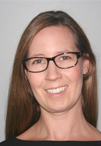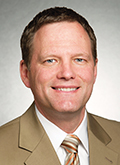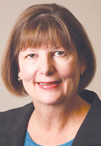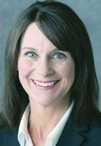BY: LAURA MCKINNIS, MSN, NP-C, TIMOTHY L. GLOVER, MDiv, MARY STARMANN-HARRISON, AND KIMBERLY LEUGERS
In keeping with our focus on major topics in Catholic health care, we asked several people active in the ministry to write about topics that keep them up at night, or occupy their thoughts on their drive into work, or stay top of mind as they move through their day. We thank Timm Glover, Kimberly Leugers, Laura McKinnis and Mary Starmann-Harrison for sharing their thoughts with us.

McKinnis
LAURA MCKINNIS, MSN, NP-C
Emergency medicine, Milwaukee, Wisconsin
I continue to have concern for the mental, emotional and spiritual health of clinicians. People generally enter the field of medicine with the purpose of helping their fellow human beings and trying to make the world a better place. But years of work in difficult environments takes a toll. The current state of health care has magnified these challenges. Burnout is steadily increasing among clinicians, and it takes different forms. People may become angry or closed off, both to their patients and their loved ones. For others, burnout can lead to depression and chemical addiction.
I believe one sign of burnout is the dehumanization of our patients and, therefore, ourselves. One example of dehumanization is the manner in which we mark the passing of a patient in death. Often when a patient dies, nothing is done to mark the importance and humanity of the event.
Immediately after an unsuccessful resuscitation, everything goes quiet. It's calm, almost silent. Those who were performing chest compressions catch their breath. There is a moment when no one quite knows what to do or what to say. The team then quickly leaves the room to catch up on all the responsibilities of the department.
We don't take the time to comprehend the effect upon ourselves of tragedy and grief. In order to cope, we build walls that separate us from our own sadness and stress. As a consequence, we become less human.
Clinicians bear witness to grief. This can be at the moment of death, but grief occurs in many other forms. We witness the grief of addiction, mental illness, abuse and poverty. If we ignore this grief, we separate ourselves from others. If we think we can just walk out of a room and never deal with the trauma we witness, we are fooling ourselves.
To be in the presence of suffering and death and feel moved is to be human. To enter into shared experience with our fellow humans is powerful. It is good to pause and feel the weight of grief and pain in order to move through it and grow.
There can only be healing when we are aware of the suffering. It is healthier to slow down and engage with suffering than to ignore it and pretend we feel nothing.
"Suppressed grief suffocates, it rages within the breast, and is forced to multiply its strength." — Ovid

Glover
TIMOTHY L. GLOVER, MDiv
Senior vice president, mission integration, Ascension, St. Louis
I use my drive into work to anchor myself more deeply within my morning prayer and spiritual practice. I often will take a simple pause before starting my car or make use of stop lights as a centering practice or "sacred pause" between my stream of thoughts or preoccupation with a specific priority or burning topic.
There is never a lack of burning topics, so I find that it is much more important to center myself in God's unchanging nature amid all of them. My top priority often revolves around the need to establish or return to my central intention and grounding of spiritual presence within God's love. For me, this gentle turning of my awareness and attention provides the centering and clarity— a holding environment as it were — for my other thoughts.
For the most part, my thoughts these days gather around two themes or reflection questions. The first has to do with our calling to the loving ministry of Jesus as healer. On any given day, what is the healing our world is in most need of, and how can Ascension — and Catholic health care as a whole — contribute to bringing about that much needed, holistic healing?
My second reflection question is about how "who we are" (our identity as a ministry of the church) and "why we are" (our mission, our purpose, the outpouring actions that are inspired by our identity) can become an ever-greater influencer of our vision, transformation, decision-making and actions.

Starmann-Harrison
MARY STARMANN-HARRISON
CEO, Hospital Sisters Health System, Springfield, Illinois
The challenges in health care are numerous, ever-changing, and they evolve with each passing week. Hospital Sisters Health System's mission is to provide high quality Franciscan health care for all people. Nationally, there is significant pressure to provide high quality care at a lower cost. To achieve these goals, we must have an integrated system of care, from wellness and prevention to senior and end-of-life care.
We cannot be successful if we focus on only one silo of care. This approach presents many challenges — government regulations and requirements, insurance mandates and often less or inadequate funding. HSHS knows that partnering with others across the continuum of care will be necessary to move forward in the future. In addition, our geographic footprint covers many rural areas as well as larger communities. Access to high quality local affordable care will continue to be a major priority.

Leugers
KIMBERLY LEUGERS
System vice president, strategic alignment, Catholic Health Initiatives, Englewood, Colorado
It is a God-given blessing to guide governance and management as they deliberate questions about transforming health care and meeting the many challenges of an uncertain future. But scenario planning at 2:00 a.m. is a big burden. My mindfulness falls to pieces when I lie awake thinking about unsustainable economics, uncertain access and a new focus on the social determinants of health — our transformation from sick care to well care.
Three key questions and concerns always contribute to those sleepless nights:
Are we leading change in insurance reform? "A Kaiser Family Foundation analysis finds that a significant share (18 percent) of inpatient hospital admissions include bills from providers that are not in the health plan's networks, often leaving patients vulnerable to higher cost-sharing and potentially huge additional bills from providers.1 Although balance billing is not new to health systems, it needs to be more clear to the consumer. It has becomes a very personal concern when I can't answer questions such as, "How do I know if a provider is in-network when I am in the hospital?" or, "Why do I pay the full charges when my insurance company decided my surgery didn't warrant a surgical assistant?"
Do all of our providers and partners take Medicaid and Medicare fee for service? "It's troublesome when it takes almost 30 days to get an initial appointment with a primary care physician."2 On top of that recurring issue, we add questions around whether or not someone has the proper insurance coverage, or whether or not providers take Medicaid or Medicare fee for service. "The ACA's temporary increase in Medicaid payments for [primary care physicians] PCPs did not result in more PCPs participating in Medicaid."3 Health system leaders know access to primary care depends on myriad variables. It's a personal concern when advising family members to keep their Medicare Advantage plan regardless of the extra monthly cost, or to sign up for a Medicaid managed-care plan to ensure better access.
Beyond programs and initiatives, are we creating systematic change around the social determinants of health? "There is growing recognition that social and economic factors shape individuals' ability to engage in healthy behaviors."4 Health system leaders know that "population health suffers when weak ties isolate medical care from social service."5 It's a personal concern when I park at my local big box store and see homeless people living in their vehicles or standing on the street corner with their children, begging for donations.6
When questions swirl around unsustainable economics, uncertain access and the social determinants of health, my mindfulness focuses on Psalm 46:11, "Be still and know that I am God." I find comfort in the stillness and the knowledge that Catholic health care leaders across the country are wrestling with the same questions — and are determined to find the right answers.
NOTES
- Henry J. Kaiser Family Foundation, "Analysis: For Patients with Large Employer Coverage, about 1 in 6 Hospital Stays Includes an Out-of-Network Bill," news release, Aug. 13, 2018. www.kff.org/health-costs/press-release/analysis-for-patients-with-large-employer-coverage-about-1-in-6-hospital-stays-includes-an-out-of-network-bill.
- Alyssa Rege, "Patient Wait Times in America: 9 Things to Know," Becker's Hospital Review, web site, June 9, 2017. www.beckershospitalreview.com/hospital-physician-relationships/patient-wait-times-in-america-9-things-to-know.html.
- Advisory Board, "The ACA Boosted Medicaid Payments for Two Years. But Doctors Were No More Likely to Take Medicaid Patients, Studies Find," Daily Briefing web site July 24, 2018. www.advisory.com/daily-briefing/2018/07/24/medicaid-payment.
- Samantha Artiga and Elizabeth Hinton, "Beyond Health Care: The Role of Social Determinants in Promoting Health and Health Equity," Henry J. Kaiser Family Foundation, Disparities Policy, Issue Briefs, May 10, 2018, website. www.kff.org/disparities-policyissue-brief/beyond-health-care-the-role-of-social- determinants-in-promoting-health-and-health-equity/.
- Zachary Pruitt et al., "Expenditure Reductions Associated with a Social Service Referral Program," Population Health Management website, April 17, 2018. www.liebertpub.com/doi/10.1089/pop.2017.0199.
- Karen Bennett, "What It's Really Like to Sleep in the Walmart Parking Lot," Money and Career Cheat Sheet, website, Feb. 15, 2018. www.cheatsheet.com/money-career/what-its-really-like-to-live-in-the-walmart-parking-lot.html/.